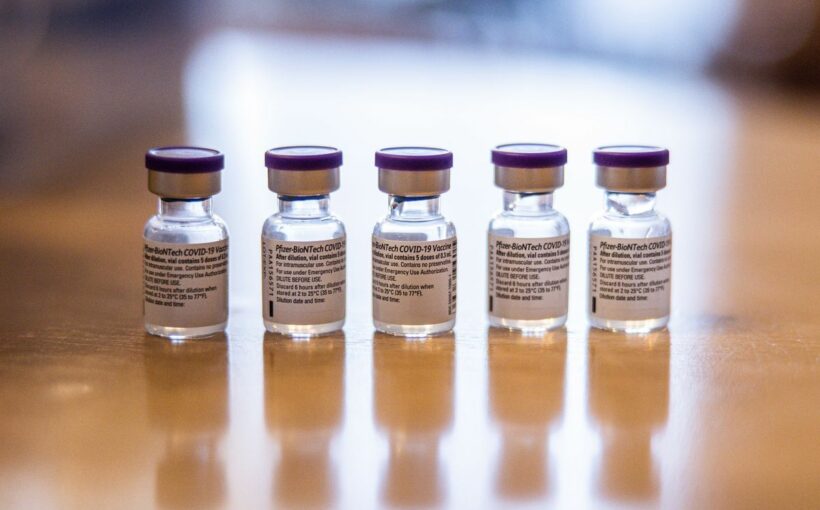In this article
Sign up here for our daily coronavirus newsletter on what you need to know, andsubscribe to our Covid-19 podcast for the latest news and analysis.
Few people care who made their flu shot or their childhood immunizations against a range of deadly diseases. Covid changed that, turning vaccine makers into household names and prompting calls for choice.
Doses remain scarce for now, amid a global scramble inflamed by adispute between the European Union and British drugmakerAstraZeneca Plc. Most of the more than 90 million people who’ve gotten a shot consider themselves lucky for any protection against the pandemic. But vaccines are proliferating, with positive trial data fromJohnson & Johnson andNovavax Inc. placing their candidates next in line for approval.
Health officials will have to figure out how to allocate all these different vaccines. The European Medicines Agencyapproved the AstraZeneca vaccine on Friday for all adults, but limited trial data on its effectiveness in the elderly has led some countries to impose restrictions. Germany said it should be used only for those under 65, while Italy cautioned against administering it to those over 55.
Many people who’ve been boning up on efficacy rates, dosing schedules or side effects want to decide for themselves. If the options are a shot from a Western drugmaker that’s been vetted by an independent regulator or one from a Russian or Chinese lab with lesser transparency, that desire is even greater.
“We demand the government to provide people the freedom of choice,” said Gergely Arato, a member of the opposition Democratic Coalition party in Hungary.
Hungary broke ranks with other EU members to approve Russia’s Sputnik V and a vaccine from China’sSinopharm Group Ltd. alongside the three shots cleared by Europe’s drug regulator — fromPfizer Inc.,Moderna Inc. and AstraZeneca. While Prime Minister Viktor Orban is technically offering choice, his promotion of the Chinese and Russian shots is endangering people’s “willingness to get vaccinated,” Arato said at a press conference this month.
In the U.S., where the only two shots authorized so far — from Pfizer and Moderna — use similar technology and demonstrated virtually identical test results, choice may matter less for now. Elsewhere, however, some health authorities have begun catering to people’s concerns about vaccine differences.
Dubai, Hong Kong
In Dubai, residents older than 60 or with pre-existing conditions can access the shot Pfizer developed withBioNTech SE, or the one from Sinopharm.
In Hong Kong, officials ordered enough doses of vaccines from Pfizer-BioNTech,Sinovac Biotech Ltd. and AstraZeneca — along with plans to secure a fourth option — to cover the 7.5 million residents.
The Pfizer shot will be available at community vaccination centers, with the Sinovac and Astra options offered at private hospitals and clinics, and people will be given the choice of which they want to receive. That’s important in Hong Kong, where some people are wary of taking a Chinese-made vaccine.
“If residents don’t want to take a certain vaccine, they can choose to get the shots at another time and another location,” Chief Executive Carrie Lam said in December.
Supplies are so tight in most of the world that choice remains impossible. Those getting shots often have no idea which one they’ll receive until they walk through the door of a vaccination center or doctor’s office. But that could change if vaccines from the likes of J&J, Novavax andCureVac NV come on stream in the coming weeks, and as pharma giants likeSanofi andNovartis AGlend their heft to the production effort.
EU Approval
Even if they don’t offer choice, health officials have to decide who gets what. At theCleveland Clinic, Cassandra Calabrese has been telling patients to take whatever vaccine they get offered, even though some have been asking her which one she’d recommend. “Things may be different as more are approved,” she said in an email.
The European Union, criticized for its slow rollout of the Pfizer-BioNTech and Moderna vaccines, expanded its offerings Friday by approving AstraZeneca’s shot. In a sign of the growing tide of people wanting to choose, the approval came after days of pitched debate about the shot’s efficacy, with Germany’s immunization commission recommending against its use in seniors.
In the U.K., where infections and fatalities are much higher than in Hong Kong, health authorities are prioritizing the quick inoculation of as many people as possible. The second dose of two-shot vaccines is being delayed in an effort to get first injections into as many arms as possible. Other countries are considering similar steps.
Distribution is based on “supply and logistics, such as availability of very cold freezers,” a U.K. Department of Health spokesman said by email. The Pfizer-BioNTech and Moderna shots must be kept frozen for long-term storage, while refrigeration suffices for the AstraZeneca vaccine.
Efficacy Rates
Although the U.K. has set a priority list for vaccine recipients — starting with the oldest, most vulnerable people — it doesn’t allocate the different shots based on a person’s profile, the agency added. So one 80-year-old patient might receive the AstraZeneca shot while someone else with the same age and health conditions might get the Pfizer one.
Some Britons are expressing a preference on the grounds of patriotism rather than what they might have read about different efficacy rates or side effects. Never mind that the U.S. company’s vaccine was 95% effective in large trials, compared with an average of 70% for AstraZeneca’s shot.
“They’re saying they want to wait for the British one,” Jimmy Whitworth, a professor of public health at the London School of Hygiene and Tropical Medicine, said in a phone interview. “I think that it’s purely a nationalistic viewpoint.”
— With assistance by Veronika Gulyas, Jinshan Hong, and Adveith Nair
Source: Read Full Article
